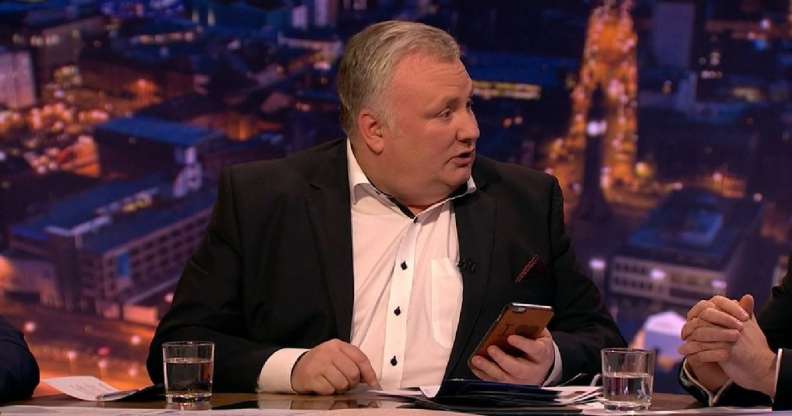By Gabriel Princewill-
The boss of BBC Northern Ireland appears to be evading accountability with regards the sexually explicit images one of his star presenter sent to a now jailed former Celebrity Big brother star, Stephen Bear.
Adam Smyth, is facing mounting scrutiny over his response to the reprehensible actions of Nolan, after this publication concluded he is evading accountability in relation to sexual misconduct within his jurisdiction.
Nolan is the fifth-highest paid talent with the BBC, earning between £400,000–£404,999.
Bear was sentenced to 21 months in jail in March this year for voyeurism and two counts of ‘revenge porn’ featuring his former girlfriend Georgia Harrison.
The disgraced reality star had just won Celebrity Big Brother at the time that Nolan allegedly wanted him on his show. Bear stripped off on the show during his appearance on Nolan Live in 2016, where both he and Nolan posed in their underpants in front of a live audience.
The broadcaster said it took ‘appropriate action’ following an internal investigation into “sexually explicit images” that Mr Nolan sent of reality star Stephen Bear.
It follows reports from the Irish News that it obtained documents which reveal details of a complaint regarding the presenter sending provocative photographs of Bear to a group chat involving colleagues that worked on his radio and television shows.
The broadcaster said it conducted an internal investigation into the matter and stated that “appropriate action” was taken in accordance with the organization’s disciplinary policy in 2018, but has not stated what those actions were, citing ”fairness and ”confidentiality”, as its reason.
An investigation reportedly led to a case to be answered under the BBC’s disciplinary policy in 2018, with the organization stating “appropriate action” was taken.
Today, Smith declined to comment about what actions he took with respect Nolan’s conduct following his internal investigation, making his words amount to mere rhetoric in the absence of more definitive statements over the matter.
Revelations that Nolan, sent sexually explicit images of reality star Stephen Bear to a group chat involving colleagues who worked on his radio and television shows have triggered a renewed focus on the BBC’s handling of workplace complaints, especially when they involve high-profile figures.
Confidentiality is a cornerstone of ethical business practices, fostering trust and providing a safe environment for employees to voice concerns.
However, when allegations of sexual improprieties, such as sending explicit images to colleagues, arise in the workplace, most analyst believe the concept of confidentiality undergoes a critical transformation.
The recent case involving star presenter Stephen Nolan and the response from BBC Northern Ireland’s Director sheds light on the fallacy of confidentiality in such situations and highlight its lack of credibility.
Sexual improprieties committed by an employee, particularly in a high-profile position like that of Stephen Nolan, transcend the boundary of private matters. They breach the realm of professional conduct, integrity, and create an uncomfortable and potentially unsafe environment for colleagues.

Stephen Nolan is at the centre of a new BBC controversy regarding sending explicit images
Confidentiality Is No Absolute Shield
Confidentiality has historically never been an absolute shield, for several compelling reasons. Sexual improprieties committed by an employee, particularly in a high-profile position like that of Stephen Nolan, transcend the boundary of private matters.
. When an employee’s actions jeopardize this trust and the integrity of the organization, the imperative to address the issue openly always supersedes the desire for confidentiality.
Commenting on the BBC Director’s comments, media analyst Yvonne Pearson said: ”Hiding behind confidentiality to avoid discussing allegations of sexual improprieties can be perceived as an attempt to protect the reputation of the accused at the expense of justice for the victim.
‘The persistence of sexual improprieties within an organization is often symptomatic of a larger problem within an organization’s culture.
‘A workplace that permits or ignores such behavior can lead to a hostile environment and perpetuate a cycle of abuse. By addressing these issues transparently and taking appropriate actions, organizations can signal their commitment to upholding ethical standards, and encourage a culture of respect and accountability.
‘The credibility of confidentiality as a reason for non-disclosure diminishes further when considering the power dynamics involved in such cases.
‘Public figures, like Stephen Nolan, wield considerable influence and hold a unique position in society. Their actions and behavior hold greater significance and can impact a broader audience. Shielding such individuals with confidentiality could inadvertently perpetuate a culture of impunity and privilege, undermining the fundamental principles of justice.
‘Adam Smyth’s reference to confidentiality in the context of sexual improprieties raises concerns about the sincerity of the organization’s response. In cases involving such allegations, the public’s expectation is not only for a fair investigation, but also for a clear and credible explanation of the actions taken.
The Expectations of the British Public
The BBC occupies a unique and influential position in British society. It is publicly funded and is entrusted with the responsibility of delivering accurate, unbiased, and ethical content to the masses. With this responsibility comes the expectation that the organization will demonstrate transparency and accountability when dealing with matters involving its own employees, particularly those in the public eye.
The British public looks to the BBC not only as a source of news and entertainment, but also as an exemplar of ethical conduct.
When allegations of inappropriate behavior surface, especially involving a well-known presenter like Stephen Nolan, the public anticipates a prompt and transparent response from the broadcaster. This expectation is grounded in the belief that the BBC should uphold the same high standards it sets for the rest of society.
This response is reminiscent of the sluggish action taken following original complaints about BBC presenter Huw Edwards made directly to the broadcaster. Its slow reaction eventually led the complainant- the teenager’s mother in that case- taking the story to The Sun Newspaper, which in our well reasoned view, acting appropriately at the time in publishing the story, notwithstanding the criticism that have been levied against the decision.
The Role of the Director
Adam Smyth, as the Director of BBC Northern Ireland, holds a pivotal position in shaping the organization’s response to such allegations. While the Director speaks of “fairness and confidentiality,” it is crucial to remember that public figures like Stephen Nolan exist within a unique realm where their actions can have far-reaching consequences. As a public broadcaster, the BBC is accountable not just to its employees but also to the public that funds its operations
Ultimately, it is an established fact that the public’s right to expect openness and accountability from the BBC, especially when dealing with matters as sensitive as workplace misconduct.
Sexual improprieties committed by an employee, particularly in a high-profile position like that of Stephen Nolan, is known to transcend the boundary of private matters.
The BBC is entrusted with maintaining not only a healthy work environment but also the public’s trust. When an employee’s actions jeopardize this trust and the integrity of the organization, the imperative to address the issue openly supersedes the desire for confidentiality.
Shielding such individuals under the guise of confidentiality could inadvertently perpetuate a culture of impunity and privilege, undermining the fundamental principles of justice.
When asked what actions were taken by BBC Northern Ireland following their internal investigations, Mr Smyth said in a statement: “There are important considerations of fairness and confidentiality involved in the handling of any workplace-related complaint.
“We take these obligations seriously – and in the interests of everyone involved,” he continued.
“It is for these reasons that we cannot comment on the specifics of any individual case, who/what it may have involved or its outcome.”
The Eye Of Media told BBC Northern Ireland that its response amounted to an evasion of accountability and fails to demonstrate that the matter was taking seriously enough. BBC NI was urged to at least categorically state that it took notable action following its investigation, but the corporation responded saying it had nothing further to add.
The BBC Director’s purported claims to have taken the allegations seriously, appear to be mere rhetoric.




